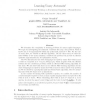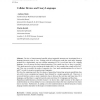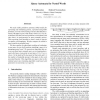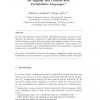14 search results - page 1 / 3 » On Regularity of Unary Probabilistic Automata |
115
Voted
JALC
2007
15 years 2 months ago
2007
We determine the complexity of learning problems for unary regular languages. We begin by investigating the minimum consistent dfa (resp. nfa) problem which is known not to be app...
132
click to vote
FUIN
2007
15 years 2 months ago
2007
Devices of interconnected parallel acting sequential automata are investigated from a language theoretic point of view. Starting with the well-known result that each unary language...
122
click to vote
MFCS
2009
Springer
15 years 9 months ago
2009
Springer
We study visibly pushdown automata (VPA) models for expressing and evaluating queries, expressed using MSO formulas, on words with a nesting structure (like XML documents). We deļ...
117
click to vote
TCS
2008
15 years 1 months ago
2008
Several mathematical distances between probabilistic languages have been investigated in the literature, motivated by applications in language modeling, computational biology, syn...
125
click to vote
QEST
2008
IEEE
15 years 8 months ago
2008
IEEE
In [3] a probabilistic semantics for timed automata has been deļ¬ned in order to rule out unlikely (sequences of) events. The qualitative model-checking problem for LTL propertie...




